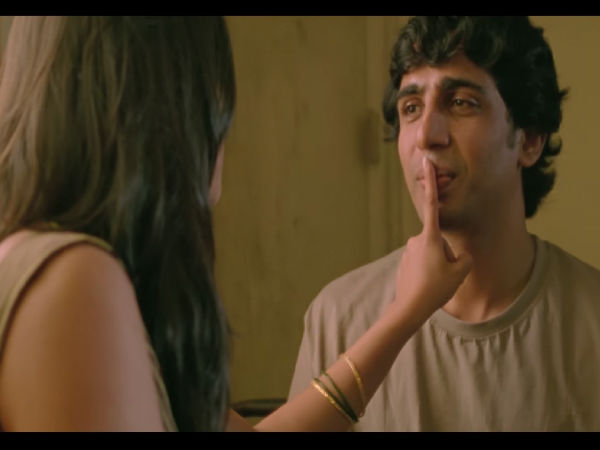My Mirror column today:
Harshvardhan Kulkarni's indulgent but refreshingly forthright film Hunterrr opens a much-needed window onto the lustful Indian man. But the catch is, where there's a hunter, there must be prey.
Harshvardhan Kulkarni's indulgent but refreshingly forthright film Hunterrr opens a much-needed window onto the lustful Indian man. But the catch is, where there's a hunter, there must be prey.
Watching Hunterrr made me think about
two things. One is sex, which is what the movie proclaims it's about.
The other is childhood. (For Hunterrr, they're necessarily connected,
but we'll get to that soon enough.)
Let me begin with the childhood part.
Hunterrr surprised me with its desire to start its story -- the tale
of Mandar Ponkshe, middle class Marathi man in his mid-to-late-30s –
in his long-ago childhood. Because the hero's childhood is among the
forgotten tropes of Hindi cinema as we once knew it. It has more or
less disappeared from our lives, along with identical twins, cabaret
dancers and self-sacrificing mothers.
In recent years, I can only think of a
few commercial Hindi films that have used the hero's childhood as a
device. My favourite of the lot is Dibakar Banerjee's unerringly
brilliant Oye Lucky Lucky Oye, where Abhay Deol's adult life of theft
and skulduggery is shown as the narrative consequence of a childhood
experienced as one of emotional and material lack. The West Delhi
childhood sections, with the wonderful Manjot Singh as the young
Lucky, set the tone for the film's powerful evocation of Lucky's
vulnerability and class resentment.
But more widely watched is Dabanng,
with its obvious homage to the angry child of the Bachchan era (even
if he grows up to be Salman Khan). Most recently, as I noted in this
column, there was Shamitabh, whose deliberately meta-filmi tribute to
our national cinema obsession involved a long initial section in
which the hero's film-obsession is tracked through childhood and
adolescence. (That first half-hour was easily the best part of
Shamitabh.) Dhanush seems to attract films with expansive portrayals
of adolescence – Raanjhana (2013) also sought to explain his
character's grown-up obsession (in that case, with Sonam Kapoor's
Zoya) with a long childhood sequence.
Director Harshvardhan Kulkarni also
goes to childhood to explain a specific obsession of his hero: sex.
But his treatment shares nothing with the Ma-and-melodrama memories
that have been the stuff of traditional Hindi cinema
childhoods—parents, for instance, barely figure. Instead, it feels
akin to the critically-acclaimed realist Marathi cinema of recent
years, in which childhood seems to have acquired a rare pride of
place. Contemporary Marathi films as different in tone and intent as
Vihir, Shala, Baboo Band Baaja, Fandry and Killa have centred on
children's relationships with each other, and with the world. Usually
rural and small-town in their settings, several of these films seem
to draw on their writers' and directors' personal memories of
childhood. But in them, children are the primary protagonists; they
don't grow up to become the hero and his friends.
So it's interesting to find Kulkarni
combining these two cinematic approaches to childhood. Narrated in
the voice of Mandar's bada bhai, a plump softie called Dilip who is
fondly and forever known as Yusuf, Hunterrr's childhood sections are
perhaps its most disarming. The vision of long summer holidays in a
village, with the three cousins plunging into ponds and ignoring the
weary harangues of grandmothers, is filled out with superbly
convincing juvenile pissing competitions and and banter about wives
soaping husbands' backs.
In another interlude, we see the young
Mandar, having failed to get Agneepath tickets, skulking past the
house-full main theatre to a side screen, where he is initiated into
the joys of Hawas ki Rani. There's a hilarious classroom scene
just after, in which he learns which of his classmates underwent the
same rite of passage. But not all of this rampant boyhood sexuality
is quite as innocuous. It is apparently no great distance from
salivating over Hawas ki Rani to feeling up women in a
marketplace.
Whether making a film like Hunterrr, in
which it is the hero and not the villain who does such things, must
automatically to be viewed as 'problematic', is a question that needs
another column— but let me say that not all cinematic depictions of
reality need be understood as celebrations of it.
For me, it was actually refreshing to
see a fleshed-out, honest portrayal of the lustful Indian man we all
know. But while joining the likes of Band Baaja Baaraat and Shuddh
Desi Romance in moving happily away from the mammoth hypocrisy in
which a sugary 'pure' love used to inhabit an imaginary stratosphere
far removed from 'dirty' sex, Hunterrr continues to perpetuate
another sort of myth. The women in this film are only interested in
sex as a route to love, unless they're married – in which case they
seem fabulously hard-nosed about wanting only sex. I have to concede
that this doesn't seem all that unbelievable, but one does come away
with the feeling that if Kulkarni had even half as much interest in
understanding them as he does in Mandar, he might have ended up with
least one exception.
As it stands, what we have is one scene
in which the brilliant Radhika Apte, playing the arranged marriage
prospect that Mandar has set his heart on, finally learns of his life
as a scorer. As Mandar (Gulshan Devaiah, also superb) makes his
hesitant confession, Apte's Trupti, with shining eyes, sketches their
future life in an open marriage. Mandar can't believe his luck. But
then Trupthi turns out to have been testing him, only to reject him
out of hand. And then, in one of Hunterrr's unending sleights of
hand, the whole conversation turns out to have been in Mandar's
imagination.
I'm waiting for the day when we have a
Hindi film in which a Trupti can actually imagine that open marriage
– not as male fantasy, but her own.

No comments:
Post a Comment